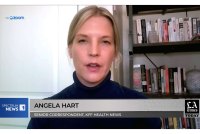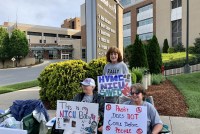Latest KFF Health News Stories
Watch: California and Feds Invest in Health Care for Homeless People
KFF Health News senior correspondent Angela Hart discusses big developments in street medicine, both statewide and nationally.
What the Health? From KFF Health News: The New Speaker’s (Limited) Record on Health
The House finally has a new speaker: Mike Johnson (R-La). He’s a relative newcomer who’s been a lower-level member of the House GOP leadership. And while he’s an outspoken opponent of abortion and same-sex marriage, his record on other health issues is scant. Meanwhile, the National Institutes of Health appears on track to be getting a new director, and Georgia’s Medicaid work requirement experiment is off to a very slow start. Alice Miranda Ollstein of Politico and Rachel Cohrs of Stat join KFF Health News’ Julie Rovner to discuss these issues and more. Also this week, Rovner interviews Michael Cannon, director of health policy studies at the Cato Institute, a libertarian think tank.
Storing Guns Away From Home Could Reduce Suicides, but Legal Hurdles Loom
Safe storage maps show gun owners where to put their firearms for safekeeping if they experience a mental health crisis. The idea has support among some gun enthusiasts, but legal obstacles threaten wider adoption.
Epidemic: What Good Is a Vaccine When There Is No Rice?
What good is a vaccine when there is no rice? Episode 7 of “Eradicating Smallpox” explores the barriers public health workers face in communities where people’s basic needs aren’t being met.
Why Is Finding Covid Shots for Young Children Still So Hard?
In Los Angeles and elsewhere, some parents are having trouble finding the new pediatric covid shot, especially for young children. Not all pediatricians or pharmacies have it and can administer it, even if vaccines.gov says they can.
What the Health? From KFF Health News: The Open Enrollment Mixing Bowl
Open enrollment for Medicare beneficiaries with private health plans began Oct. 15, to be followed Nov. 1 by open enrollment for Affordable Care Act plans. The selection for both is large — often too large to be navigated easily alone. And people who choose incorrectly can end up with unaffordable medical bills. Meanwhile, those on both sides of the abortion issue are looking to Ohio’s November ballot measure on abortion to see whether anti-abortion forces can break their losing streak in statewide ballot questions since the overturn of Roe v. Wade in 2022.
Listen: Inroads for Women in California’s Health Care Workforce
KFF Health News senior correspondent Angela Hart leads a discussion about the role women play as California grapples with a shortage of health care providers.
What the Health? From KFF Health News: Health Funding in Question in a Speaker-Less Congress
A bitterly divided Congress managed to keep the federal government running for several more weeks, while House Republicans struggle — again — to choose a leader. Meanwhile, many people removed from state Medicaid rolls are not finding their way to Affordable Care Act insurance, and a major investigation by The Washington Post attributes the decline in U.S. life expectancy to more than covid-19 and opioids. Lauren Weber of The Washington Post, Victoria Knight of Axios, and Sarah Karlin-Smith of the Pink Sheet join KFF Health News chief Washington correspondent Julie Rovner to discuss these issues and more. Also this week, Rovner interviews physician-author-playwright Samuel Shem about “Our Hospital,” his new novel about the health workforce in the age of covid.
An Arm and a Leg: John Green vs. Johnson & Johnson (Part 1)
Pharmaceutical patents can drive up the costs of lifesaving medications. Hear what author and YouTube star John Green is doing to make tuberculosis drugs more accessible to the people who need them most.
Thousands Got Exactech Knee or Hip Replacements. Then, Patients Say, the Parts Began to Fail.
In a torrent of lawsuits, patients accuse Florida device maker Exactech of hiding knee and hip implant defects for years. The company denies the allegations.
Epidemic: Bodies Remember What Was Done to Them
Trust is hard to build and easy to break. In Episode 6 of the “Eradicating Smallpox” podcast, meet Chandrakant Pandav, a health worker who used laughter and song to try to rebuild trust with communities harmed by India’s sometimes violent and coercive family planning campaign.
In this special encore episode, KFF Health News’ “What the Health?” asks three people who have served as the nation’s top health official: What does a day in the life of the U.S. secretary of Health and Human Services look like? And how much of their agenda is set by the White House? Taped in June before a live audience at Aspen Ideas: Health, part of the Aspen Ideas Festival, in Aspen, Colorado, host and chief Washington correspondent Julie Rovner leads a rare conversation with the current and two former HHS secretaries. Secretary Xavier Becerra and former secretaries Kathleen Sebelius and Alex Azar talk candidly about what it takes to run a department with more than 80,000 employees and a budget larger than those of many countries.
More Schools Stock Overdose Reversal Meds, but Others Worry About Stigma
Colorado is among several states that ensure schools have access to the opioid overdose reversal medication naloxone for free or at reduced cost. But most districts hadn’t signed up by the start of the school year for a state distribution program amid stigma around the lifesaving treatment.
Más escuelas tienen el medicamento para revertir sobredosis, pero otras se preocupan por el estigma
La Administración de Salud Mental y Abuso de Sustancias federal recomienda que las escuelas, incluidas las primarias, tengan naloxona disponible, ante el aumento de las sobredosis mortales de opioides, especialmente de la potente droga fentanilo.
These Appalachia Hospitals Made Big Promises to Gain a Monopoly. They’re Failing to Deliver.
Ballad Health, the only hospital system across a large swath of Tennessee and Virginia, has fallen short of quality-of-care and charity care obligations — even as it’s sued thousands of patients for unpaid bills.
She Received Chemo in Two States. Why Did It Cost So Much More in Alaska?
A breast cancer patient who received similar treatments in two states saw significant differences in cost, illuminating how care in remote areas can come with a stiffer price tag.
What the Health? From KFF Health News: More Medicaid Messiness
At least 30 states are reinstating coverage for children wrongly removed from the rolls under Medicaid redetermination, the federal government reported. It’s just the latest hiccup in the massive effort to review the eligibility of Medicaid beneficiaries now that the program’s pandemic-era expansion has expired. And federal oversight of the so-called unwinding would be further complicated by an impending government shutdown. Rachel Roubein of The Washington Post, Sandhya Raman of CQ Roll Call, and Sarah Karlin-Smith of Pink Sheet join KFF Health News chief Washington correspondent Julie Rovner to discuss these issues and more. Also this week, Rovner interviews KFF Health News’ Samantha Liss, who reported and wrote the latest KFF Health News-NPR “Bill of the Month” feature, about a hospital bill that followed a deceased patient’s family for more than a year.
Episode 5 of the “Eradicating Smallpox” podcast explores how a partnership between public health institutions and a huge, influential private company was key in the campaign to eliminate smallpox.
What the Health? From KFF Health News: Countdown to Shutdown
Congress appears to be careening toward a government shutdown, as a small band of House conservatives vow to block any funding for the fiscal year that begins Oct. 1 unless they win deeper cuts to health and other domestic programs. Meanwhile, former President Donald Trump continues to roil the GOP presidential primary field, this time with comments about abortion. Alice Miranda Ollstein of Politico, Rachel Cohrs of Stat, and Tami Luhby of CNN join KFF Health News chief Washington correspondent Julie Rovner to discuss these issues and more. Also, for “extra credit,” the panelists suggest health policy stories they read this week they think you should read, too.
Watch: Thinking Big in Public Health, Inspired by the End of Smallpox
A conversation about how the lessons from the victory over smallpox could be applied to public health challenges today.


















